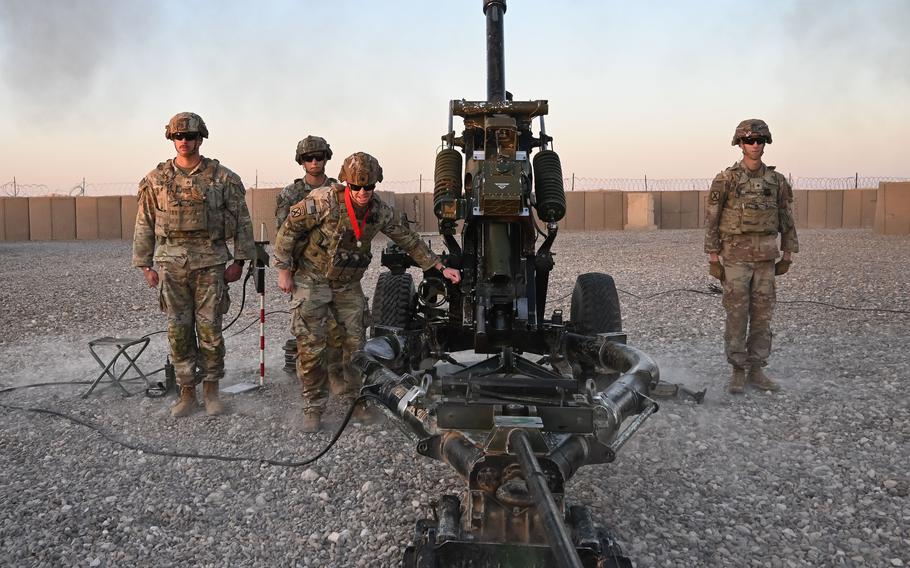
U.S. Army Chief Warrant Officer 3 Joseph Thigpen fires a 105 mm illumination round from the M119A3 Howitzer during a ceremony at al-Asad Air Base, Iraq, in January. U.S. forces came under rocket attack July 25, 2024, at al-Asad and at Military Support Site Euphrates in Syria. No injuries or damage was reported, a U.S. defense official said July 26. (Daphney Black/U.S. Army)
Bases in the Middle East where U.S. forces are deployed recently came under rocket fire from militants, in one case for the second time in little more than a week.
Two rockets were launched Thursday at al-Asad Air Base in western Iraq, while the same day, another was fired in a separate attack at Military Support Site Euphrates in Syria, a U.S. defense official said Friday.
No damage or injuries were reported in any of the three strikes and neither installation was hit, according to the official.
The assaults came after a July 16 attack on al-Asad by two drones. Although one was shot down, the other struck the base, causing minimal damage, Pentagon spokeswoman Sabrina Singh said last week.
July has seen a resumption of such attacks on U.S. forces in Iraq and Syria after a lull of nearly three months. They are blamed on Iran-backed militant groups, which have sought retaliation following the Oct. 7 start of the Israel-Hamas war.
On April 21 and April 22, there were separate attacks at Rumalyn Landing Zone in Syria and near al-Asad, respectively, the Pentagon later said.
There are about 2,500 U.S. troops in Iraq housed at three bases, one in Baghdad and two others in west and north of the country. About 900 American service members are deployed in Syria, Voice of America reported in February.
American forces have remained in the two countries to lead a coalition fighting to prevent a resurgence of the Islamic State in a mission known as Operation Inherent Resolve.
Thursday’s rocket attacks came on the heels of meetings between U.S. and Iraqi officials in Washington earlier this week to work out the details of ending the anti-ISIS mission in Iraq.
The talks included discussion of how the U.S.-led mission would transition to a bilateral security relationship, the Pentagon said in a statement Wednesday.
Iraq wants U.S. troops to begin withdrawing in September, and it seeks to have the coalition’s work formally end by September 2025, Reuters reported Tuesday.
But officials from both countries have stressed that there currently is no formal agreement or timetable to end the coalition.
Since the Israel-Hamas war started, Iran-backed militant groups have launched at least 175 attacks on U.S. personnel in Iraq and Syria.
American forces in other areas of the Middle East have been targeted as well. A Jan. 28 drone attack on a base in Jordan killed three U.S. service members and injured more than 40 others.
In response, the U.S. launched a series of airstrikes in February against 85 targets in Iraq and Syria. Those strikes are largely credited with deterring militant groups in the two countries from continuing their attacks.